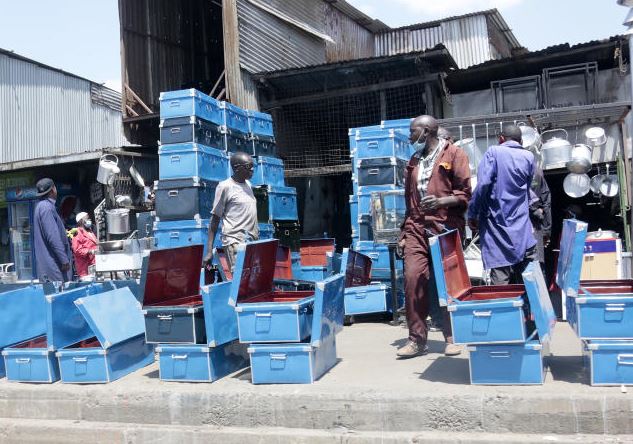 Jua Kali artisans at Gikomba Market in Nairobi. The
informal nature of our economy may have been our saving grace in the
wake of Covid-19. [Boniface Okendo, Standard]
Jua Kali artisans at Gikomba Market in Nairobi. The
informal nature of our economy may have been our saving grace in the
wake of Covid-19. [Boniface Okendo, Standard]
Some have joked that 2020 should be declared a lost year.
But the truth is that the events of 2020 will echo in 2021 and beyond.
How can we forget Covid-19 and its ravages? I will focus on the economic side of things and leave other experts to analyse the other facets of our lives.
It has already been reported that the Kenyan economy will grow at almost seven per cent per annum this year.
The projected growth would be among the top 10 in the world. Never mind that it is from a low of about one per cent in 2020. Credit goes to the resilience of the Kenyan people and some bold government policies like not closing the economy altogether.
The Kenyan economy at the height of Covid-19 was more like keeping the fire alive during the night, awaiting the next morning when embers are covered with ash. If you grew up in the countryside, this would make sense to you. If you are a ‘jamaa wa mtaa’ (city dweller), find out.
I agree with analysts that the economy will recover. The reopening of schools is a sign that things are getting back to normal. This should entice us to invest or consume and drive the economy.
Few see another silver lining: good weather espoused by rain. This will keep inflation under check and provide us with enough disposable income. Remember a majority of Kenyans are subsistence farmers, and Engel’s law says a high percentage of poor people’s income goes to food. Did I read of a drought warning?
Another silver lining is that we are slowly learning to live with Covid-19. There are risks associated with that, but the majority seem convinced we can live with the coronavirus.
Beyond schooling
Lots of economic activities beyond schooling are back to near-normal. Domestic holidaying is up, and golfers are busy again. Data from the Health ministry supports the idea that Covid-19 is getting under control, although there may still be a third wave.
Add the expected roll-out of a vaccine and the long shadow of Covid-19 will be greatly shortened. Reports that the mutant Covid-19 is not resistant to vaccines is good news, too.
We can’t forget that the nightmare scenario envisaged after Covid-19 came ashore did not come to pass. Demographics is a factor. Have you noted that the average age in slums is very low? How many ‘wazees’ (old people) do you see there?
Many Kenyans were waiting for the good news to act; they have money saved to invest or consume. One could ask why would the economy grow when so many have lost their jobs and are suffering?
Remember our economy is very informal, with about 83 per cent of Kenyans working in this sector. This saved it from fluctuations common in the West. For most people, life went on. For once, ‘poverty’ saved us from the vagaries of Covid-19.
Some could argue that Kibaki‘s shift to the East (read China) was a blessing.
We can now ride on China, which was not as badly affected by the virus as the USA or Europe. You may complain about Chinese debt, but the continuity of public works, like roads, as Covid-19 raged kept the economy humming. Remember John Maynard Keynes and economic stimulation? Just like citizens, when the economy is bad, governments borrow.
Many of us borrowed at the height of the pandemic, with online borrowing doing very well, including Safaricom’s mobile money overdraft service Fuliza. We pay debts when our fortunes improve. The government is lucky; it can pick new debt to pay old debt. Remember interest rates have gone down, making debt cheaper.
Governments can even ask for debt forgiveness. It can even shift debt to the next generation. If the debt is used to improve the productivity of the economy, it becomes easier to pay future debts.
Some have boldly suggested our political leaders are incurring more debt deliberately, not just to keep the economy alive, but to make leadership (read presidency) less unattractive. What do you think?
But the outlook is not all rosy. The post-Covid-19 recovery may be muted by high-octane politics. Can we hold a referendum and a general election within a year of each other, having just come out of Covid-19?
Two years of politicking and the political vacuum created by Uhuru Kenyatta’s constitutional limit could deflate economic growth. Some argue that the ruling class is likely to benefit from the economic recovery and will ensure there is peace as we approach 2022.
In Kenya, economics follows politics; the two are now parallel, and soon, economics will lead politics. We long for that golden age. Will that be the hallmark of the post-Covid-19 era?
What is not in doubt is that on average, 2021 will be better than 2020.
- The writer is an associate professor at the University of Nairobi.




No comments :
Post a Comment